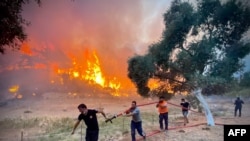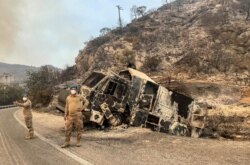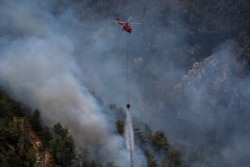As wildfires spread through Turkey’s Mediterranean and Aegean provinces, the country’s media regulator fined at least six news outlets after warning broadcasters that continuous coverage of the fires may demoralize the public.
As fires started spreading two weeks ago, Turkey’s media regulator the Radio and Television Supreme Council (RTUK) released a statement advising news outlets to cover the wildfires “meticulously with a sense of responsibility in these times when social sensitivity occurs.”
The regulator later sent a letter sent to representatives of TV channels that accused broadcasters of not covering areas where fires were successfully extinguished.
In the August 3 letter, which was shared online, the regulator said that continuous live coverage demotivates the public and firefighters. RTUK also notified TV channels that its experts are compiling reports to monitor coverage and that fines will be issued to those failing to abide by the regulator’s principles.
It followed up on that warning Wednesday, issuing fines for Fox, Tele 1, Halk TV, KRT, Haber Turk and TR 35, local media reported.
Editorial interference?
Media analysts and journalism organizations described the warning as a form of censorship and an attempt to interfere with editorial independence.
“RTUK is a supervisory and regulatory institution, but it does not have the right to interfere with the content. However, for a while, RTUK has been interfering with the content of the broadcasts,” Faruk Bildirici, a former board member for the regulator and a media ombudsman, told VOA.
The regulator released similar warnings after earthquakes and Turkey’s cross-border operations in Syria, Bildirici said, but unlike those cases, this time it included a threat of punishment for noncompliance.
Bildirici, who said he was dismissed from the regulator after voicing concern over possible conflicts of interest for its chair, said it was unlikely pro-government media received the regulator’s letter “because there is no critical news about the fires on those channels anyway.”
VOA was not able to verify which outlets received a letter and RTUK did not respond to VOA’s requests for comment.
However, in a statement released on its website, the regulator denied its letter was a threat or censorship, saying it was acting to provide a reminder of RTUK’s principles.
The regulator’s head Ebubekir Sahin also defended RTUK’s approach. In an Aug. 7 op-ed for the pro-government Turkish-language paper Star, he accused some outlets of “a manipulative broadcasting approach in order to create a panic.”
Aytun Ciray, a deputy from Turkey's opposition Iyi Party, said Wednesay he has asked the prosecutor's office to investigate Sahin.
Rights groups have previously said that the RTUK is partisan and imposes arbitrary sanctions against independent media outlets that report critically on the government.
“If the RTUK's head is not disturbed by the politically motivated silence of some broadcasters that do not seriously question forest fires or show a rosy picture, he cannot be seen as sincere with his warnings about those who are critical,” Erol Onderoglu, the Turkey representative for the Paris-based watchdog Reporters Without Borders (RSF), told VOA.
Media access
Warnings from the regulator are not the only issue for media covering Turkey’s wildfires.
Journalists from Reuters and the Turkish outlets FOX TV and Halk TV were denied access to a press conference by Energy Minister Fatih Donmez at the Kemerkoy power plant in the district of Milas on August 5.
The gendarmerie had a list of outlets that were permitted to cover the press conference. Turkish news website Bianet cited Turkey’s independent media association, the Press Council, as saying the order to block some outlets came from the Ministry of Interior.
Elif Gonul, a 55-year-old from Gokbel, a village near Milas, where wildfires had burned forests and olive groves for 11 days, told VOA she was upset because journalists sometimes misinformed the public about the fires near her village.
“[Some journalists] said the fire was under control, but it was not. So, some of them reported fake news before the fire was under control,” Gonul said, adding that it is emotionally cumbersome to follow news about the fires.
Ferruh Fedakar, a 62-year-old boat captain from the same village, told VOA that officials had informed residents when to evacuate, and that he lost his land and most of his olive groves.
He thinks that some TV broadcasts exaggerated efforts to contain the fires.
“They said the fire was responded [to] by our fleet of planes and helicopters, but one or two helicopters came and went from time to time, but we never saw a plane,” Fedakar said. The boat captain said he did not find media coverage consistent in terms of providing the number or location of fires.
“For example, someone on a TV channel says that the fire has spread from here to there for this reason. Someone says, ‘No, that was enough because of the weather conditions.’ So, they say something new every day,” he said. “This damaged my trust [in the media.]”
Fedakar said his relatives and friends called him frequently to check whether the TV coverage from his village was accurate, and he has tried to inform them about developments via phone.
Broadcast interrupted
On August 6, a news crew and guests appearing on a show for the independent Halk TV were verbally and physically assaulted during a live segment in Icmeler, a district of Marmaris where wildfires had reached the forest hills.
During a commercial break, five people approached the group and threatened to interrupt the show if the government’s response to the fires was criticized by the guests, who included two prominent journalists, a lawyer, and the mayor of Marmaris.
A skirmish followed, with one assailant appearing to grab a bottle and using it to threaten a camera operator, according to Murat Agirel, a columnist for the daily Yenicag who was a guest on the show.
Agirel filmed some of the altercation but fell when one of the attackers ran toward him.
Halk Tv yayını bastılar ve ‘’yanlış şeyler konuştuğunda engelleriz’’ diyerek yayın ekibine saldırdılar pic.twitter.com/jRKMtSlDwE
— Murat AĞIREL (@muratagirel) August 5, 2021
The assailants were detained and later were released without charges.
Agirel told VOA he thinks authorities try to “prevent the freedom of the press and to prevent the public’s right to receive information through the official institutions.”
“As a journalist, I have been on trial for years; I have been in and out of prison. Even I have forgotten how many cases there are,” Agirel said. “(But) we are still trying to fulfill the sense of responsibility and burden we feel on our shoulders.”
This story originated in VOA’s Turkish Service.






